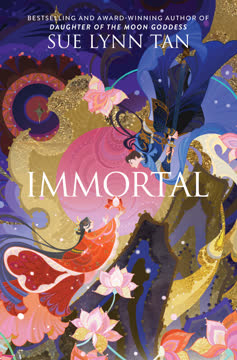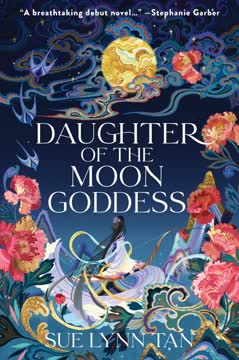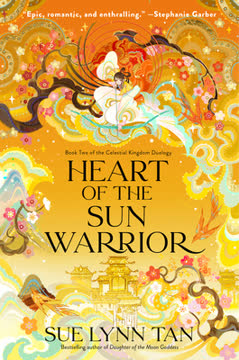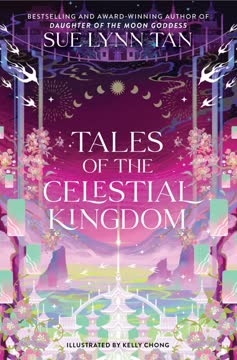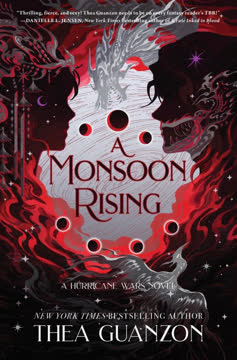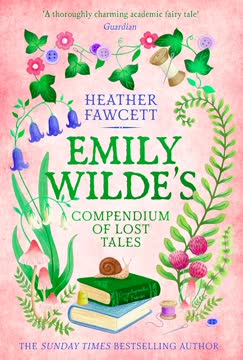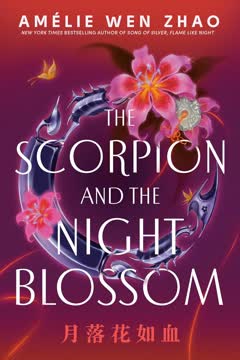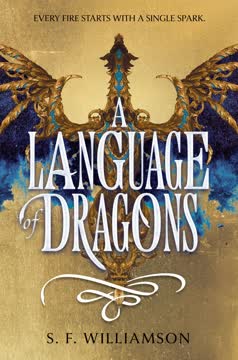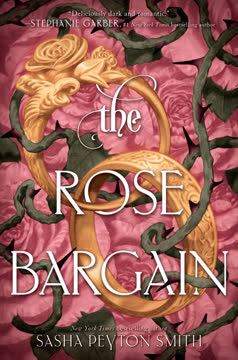Plot Summary
Flames of Betrayal and Escape
Liyen's life is upended when her home is engulfed in flames, a betrayal orchestrated by the immortals she once trusted. Her grandfather, the Lord of Tianxia, has secured a mystical treasure for the immortal queen, but the God of War's attack forces them to flee. Liyen, frail and poisoned, is thrust into a desperate escape with her grandfather, who entrusts her with a mystical lotus, the only antidote to her ailment. As they flee, her grandfather's heart gives out, leaving Liyen to face the wrath of the immortals alone. The God of War, a figure of fear and power, becomes both her enemy and savior, as she grapples with the loss and betrayal that have upended her life.
The Lotus and the Lie
Liyen's life hangs by a thread, saved only by the Divine Pearl Lotus her grandfather gave her. This mystical flower, coveted by the immortal queen, is now part of Liyen, marking her as a target. The God of War, tasked with retrieving the lotus, becomes an unexpected ally, yet his motives remain shrouded in mystery. Liyen's heart is torn between the duty to her people and the growing bond with the immortal warrior. As she navigates the treacherous politics of the immortal realm, Liyen must decide whom to trust, knowing that betrayal could come from any side.
A Kingdom in Peril
Liyen returns to a kingdom on the brink of chaos. The court is rife with ambition and deceit, as ministers vie for power in the wake of her grandfather's death. Liyen must assert her authority, even as she conceals the truth of her failed mission to secure the queen's mandate. The threat of the immortals looms large, and Liyen's only hope lies in forging a new path for Tianxia. With the God of War's sword in her possession, she must navigate the treacherous waters of court politics, all while preparing for the inevitable confrontation with the immortals.
The God of War's Deception
Liyen's relationship with the God of War deepens, fraught with tension and unspoken desires. His presence is both a comfort and a threat, as Liyen struggles to discern his true intentions. The immortal warrior's charm and power are undeniable, yet Liyen cannot forget the betrayal that brought them together. As they train together, a dangerous intimacy forms, blurring the lines between ally and adversary. Liyen must guard her heart, knowing that the God of War's loyalty lies with the immortal queen, and that their alliance is built on a foundation of lies.
A Dangerous Alliance
The Wuxin, ancient enemies of the immortals, have returned, threatening both Tianxia and the immortal realm. Liyen and the God of War must set aside their differences to face this new danger. Their alliance is fragile, built on necessity rather than trust, as they confront the Wuxin's dark magic. Liyen's resolve is tested as she fights to protect her people, knowing that the God of War's aid comes at a steep price. Together, they must navigate a world where enemies become allies, and where the line between friend and foe is perilously thin.
A Treacherous Path to Freedom
Liyen is coerced by Lord Dalian to open the gateway to Kunlun, a task fraught with danger and deceit. As she navigates the treacherous politics of the Wuxin, she discovers allies in Lin and Mei, who share her desire for peace. Despite Dalian's threats, Liyen remains resolute, determined to protect her people and prevent a war. Her journey is one of courage and cunning, as she balances the need to deceive Dalian with the urgency of her mission. The stakes are high, and Liyen must tread carefully to ensure her survival and the safety of those she loves.
The Battle for Kunlun's Gateway
The tension reaches a climax as Liyen and Zhangwei confront Dalian at the gateway to Kunlun. The battle is intense, with Zhangwei fighting valiantly against Dalian's forces. Liyen's quick thinking and bravery are put to the test as she attempts to protect the gateway from being opened. The fight is brutal, with both sides suffering losses. Liyen's determination and Zhangwei's strength are pivotal in turning the tide, but the cost is high. The battle is a testament to their love and commitment to each other and their people.
Betrayal and Redemption Unveiled
As the battle rages, Dalian's true nature is revealed. His betrayal of his own people and the depths of his ambition are laid bare. Aunt Shou, torn between her love for her son and her duty to her people, makes a heart-wrenching decision. Her actions are a poignant reminder of the complexities of love and loyalty. The chapter explores themes of redemption and the power of choice, as Aunt Shou seeks to atone for her past mistakes. Her sacrifice is a turning point, offering a glimmer of hope in the midst of chaos.
A Choice Beyond Destiny
Faced with the Mirror of Destiny, Liyen is presented with two possible futures, both fraught with destruction. Refusing to accept either, she chooses to carve her own path, rejecting the predetermined destinies. This pivotal moment is a testament to her strength and resilience, as she embraces her dual heritage and the power within her. Liyen's choice is a declaration of independence, a refusal to be bound by the expectations of others. Her decision sets the stage for a new beginning, one that is shaped by her own desires and dreams.
The Price of Return
As Liyen and Zhangwei seek a way back to their realm, they are faced with a difficult choice. The Eternal Boatman offers passage in exchange for their memories. Aunt Shou, in a final act of love, offers to pay the price, allowing Liyen and Zhangwei to return home. This chapter explores themes of sacrifice and the enduring bonds of family. Aunt Shou's decision is a poignant reminder of the power of love and the lengths one will go to protect those they care about. Her sacrifice paves the way for Liyen's return to Tianxia.
A New Dawn in Tianxia
Back in Tianxia, Liyen faces the challenges of leadership with newfound strength and wisdom. Her experiences have shaped her into a formidable ruler, one who is determined to secure a better future for her people. Zhangwei's return brings joy and the promise of a new beginning. His proposal is a testament to their enduring love and commitment to each other. The chapter concludes with a sense of hope and renewal, as Liyen and Zhangwei look toward a future filled with possibility. Their journey is a celebration of love, resilience, and the power of choice.
Characters
Liyen
Liyen is the Lady of Tianxia, thrust into leadership after her grandfather's death. Frail yet determined, she grapples with the weight of her responsibilities and the betrayal of the immortals. The Divine Pearl Lotus, a mystical flower, becomes both her salvation and her curse, marking her as a target. Liyen's journey is one of self-discovery, as she learns to wield power and navigate the treacherous waters of court politics. Her heart is torn between duty and desire, as she forms a complex bond with the God of War, her enemy and ally.
Zhangwei
Zhangwei, the God of War, is a figure of strength and loyalty. His love for Liyen is unwavering, driving him to protect her at all costs. Beneath his formidable exterior lies a man burdened by past wounds and a desperate need for redemption. His relationship with Liyen is complex, fraught with tension and unspoken desires. Zhangwei's journey is one of self-discovery, as he learns to balance his duty with his personal desires. His character is a testament to the power of love and the importance of staying true to oneself.
Grandfather (Lord of Tianxia)
Liyen's grandfather, the Lord of Tianxia, is a figure of wisdom and strength. His death leaves a void in Liyen's life, as she grapples with the loss of her mentor and protector. His final act of giving Liyen the Divine Pearl Lotus sets the stage for the conflict with the immortals. His legacy looms large over Liyen, as she strives to honor his memory and fulfill his dream of a free Tianxia.
Queen Caihong
The immortal queen of the Golden Desert, Queen Caihong is a formidable force. Her desire for the Divine Pearl Lotus drives the conflict with Liyen, as she seeks to reclaim what she believes is rightfully hers. Her relationship with the God of War is complex, as she balances her need for his loyalty with her own ambitions. Queen Caihong's wrath is a constant threat, as Liyen navigates the dangerous politics of the immortal realm.
Chengyin
Chengyin is Liyen's childhood friend and confidant, serving as her First Advisor. His loyalty to Liyen is unwavering, as he supports her through the challenges of leadership. Chengyin's presence is a source of comfort and stability for Liyen, as she navigates the treacherous waters of court politics. His friendship is a reminder of the life Liyen once knew, and the future she hopes to build for Tianxia.
Aunt Shou
Aunt Shou is a maternal figure in Liyen's life, offering guidance and support in the wake of her grandfather's death. Her wisdom and experience are invaluable to Liyen, as she navigates the complexities of leadership. Aunt Shou's journey is one of redemption, as she seeks to atone for her past mistakes. Her sacrifice is a poignant reminder of the power of love and the lengths one will go to protect those they care about.
The Wuxin
The Wuxin are ancient enemies of the immortals, possessing dark magic and a thirst for chaos. Their return threatens both Tianxia and the immortal realm, as they seek to reclaim their power. The Wuxin's motives are shrouded in mystery, as they manipulate and deceive to achieve their goals. Their presence is a constant threat, as Liyen and the God of War must unite to face this common enemy.
Lord Dalian
Lord Dalian is a complex character, driven by ambition and a desire for power. His actions are motivated by a deep-seated need for validation and control. Dalian's journey is one of betrayal and redemption, as he grapples with the consequences of his actions. His character is a testament to the destructive power of ambition and the importance of staying true to oneself.
Plot Devices
The Divine Pearl Lotus
The Divine Pearl Lotus is a powerful and coveted artifact, central to the conflict between Liyen and the immortals. Its healing properties make it a target for the God of War, who seeks its power to heal his wounds. The lotus's presence within Liyen marks her as a target, as she navigates the treacherous politics of the immortal realm. The lotus is both a blessing and a curse, as Liyen grapples with the responsibility it brings.
The God of War's Sword
The God of War's sword is a powerful weapon, symbolizing the bond between Liyen and Zhangwei. Its presence in Liyen's possession is a constant reminder of the immortal's power and the trust she must place in him. The sword is both a tool of protection and a symbol of the complex relationship between Liyen and the God of War, as they navigate the dangerous waters of their alliance.
The Gateway to Kunlun
The gateway to Kunlun is a central plot device, representing the power and choice that lies before Liyen. Its presence is a constant reminder of the stakes at play, as Liyen grapples with the decision to open it. The gateway is both a blessing and a curse, as it represents the potential for both destruction and salvation. Its role in the story is a testament to the power of choice and the importance of staying true to oneself.
The Mirror of Destiny
The Mirror of Destiny is a powerful plot device, revealing the potential futures that lie before Liyen. Its presence is a constant reminder of the stakes at play, as Liyen grapples with the decision to forge her own path. The mirror is both a blessing and a curse, as it represents the potential for both destruction and salvation. Its role in the story is a testament to the power of choice and the importance of staying true to oneself.
Analysis
"Immortal" by Sue Lynn Tan is a rich tapestry of themes exploring power, choice, and redemption. At its core, the novel is a journey of self-discovery and empowerment, as Liyen navigates the treacherous waters of court politics and immortal intrigue. The story delves into the complexities of love and loyalty, as characters grapple with their desires and duties. The Divine Pearl Lotus and the Mirror of Destiny serve as powerful symbols of the choices that define us, while the Wuxin's return highlights the ever-present threat of chaos. Through Liyen's journey, the novel underscores the importance of staying true to oneself and the transformative power of love and sacrifice.
Last updated:
FAQ
Basic Details
What is Immortal about?
- A Mortal's Ascent: Immortal follows Liyen, the frail Lady of Tianxia, whose life is upended when her home is attacked by the God of War, Zhangwei. Poisoned and dying, she receives the Divine Pearl Lotus from her grandfather, a treasure coveted by the immortal Queen Caihong, thrusting her into a world of celestial politics and ancient feuds.
- Navigating Treachery: As Liyen grapples with her grandfather's death and the weight of her new responsibilities, she finds herself entangled with Zhangwei, who is both her enemy and an unexpected protector. Their complex relationship unfolds against a backdrop of a looming war with the Wuxin, ancient adversaries seeking to reclaim their power.
- Forging a New Destiny: Liyen's journey takes her from the mortal realm to the celestial kingdom and the treacherous Netherworld, where she uncovers hidden truths about her own identity and the true nature of the conflict. She must make difficult choices that will determine the fate of her kingdom and challenge the very concept of destiny, ultimately fighting for freedom and peace for her people.
Why should I read Immortal?
- Rich World-Building: Readers seeking immersive fantasy will be captivated by Sue Lynn Tan's intricate world-building, blending celestial mythology with a unique political landscape. The novel offers a fresh take on immortal realms, complete with diverse kingdoms, magical creatures like phoenixes and qilins, and a vivid sense of place, from the Golden Desert to the eerie Netherworld.
- Complex Character Dynamics: The story excels in its nuanced portrayal of relationships, particularly the evolving bond between Liyen and Zhangwei. Their journey from animosity to a deep, complicated love is filled with emotional depth, moral ambiguities, and compelling dialogue, appealing to fans of character-driven fantasy romance.
- Themes of Agency and Sacrifice: Immortal delves into profound themes of free will versus destiny, the true cost of power, and the sacrifices made for love and duty. Liyen's struggle to define her own path and protect her people, even when faced with overwhelming odds, offers a powerful narrative about resilience and the courage to challenge established orders.
What is the background of Immortal?
- Celestial Kingdom Duology Context: Immortal is set within the broader universe of Sue Lynn Tan's Celestial Kingdom Duology, building upon its established lore of immortal realms, ancient wars, and powerful deities. While it introduces new characters and conflicts, it draws from the rich mythological tapestry previously woven, offering both new readers and existing fans a deeper dive into this fantastical world.
- Ancient Conflict's Echoes: The narrative is deeply rooted in the aftermath of a devastating war between the Golden Desert immortals and the Wuxin, a conflict that shaped the current political landscape and Liyen's mortal kingdom, Tianxia. This historical backdrop explains the immortals' dominion over Tianxia and the lingering animosity that fuels the story's central tensions.
- Cultural and Magical Foundations: The story is steeped in a blend of East Asian-inspired mythology, featuring elements like the Wangchuan River (a river of forgetfulness in Chinese mythology), celestial beings, and elemental magic. The concept of a "lifeforce" as the root of immortal power and the unique properties of artifacts like the Divine Pearl Lotus and the Mirror of Destiny are integral to the magical system and plot.
What are the most memorable quotes in Immortal?
- "We cannot help how the dice fall, but it's our choice whether to keep playing.": This quote from Liyen's grandfather (Chapter 1) encapsulates a core theme of agency and resilience in Immortal. It defines Liyen's journey, emphasizing that while fate may deal a difficult hand, one always retains the power to choose how to respond, shaping their own destiny despite adversity.
- "What is war if not suffering and death? Who would want to be the harbinger of such strife?": Spoken by Zhangwei, the God of War (Chapter 3), this quote offers a profound insight into his character, subverting the typical glorification of a warrior. It reveals his deep-seated weariness with conflict and his true nature, hinting at the hidden depths beneath his formidable exterior and challenging Liyen's initial prejudices.
- "Love is the greatest freedom in the world, but you have to be capable of yielding it, to grasp its true meaning.": Liyen's powerful retort to Dalian (Chapter 44) crystallizes the novel's exploration of love as a force of liberation, not a chain. It contrasts Dalian's manipulative view of love with Liyen's hard-won understanding, highlighting her growth and the transformative power of genuine connection.
What writing style, narrative choices, and literary techniques does Sue Lynn Tan use?
- First-Person Perspective & Emotional Depth: The novel is primarily told from Liyen's first-person perspective, offering intimate access to her thoughts, fears, and evolving emotions. This narrative choice allows readers to deeply connect with her internal struggles, particularly her journey of self-discovery and her conflicted feelings towards Zhangwei, enhancing the psychological and emotional analysis.
- Symbolism and Motif Integration: Tan masterfully weaves symbolism throughout the narrative, using recurring motifs like fire (destruction, passion, purification), water (memory, forgetfulness, healing), and specific objects like the Divine Pearl Lotus and the God of War's sword. These elements are not merely decorative but serve to deepen thematic resonance and foreshadow key plot developments, enriching the Immortal symbolism explained.
- Foreshadowing and Narrative Misdirection: The author employs subtle foreshadowing, often through seemingly innocuous dialogue or environmental descriptions, to hint at future revelations (e.g., Zhangwei's cold skin, Aunt Shou's unusual knowledge). She also uses narrative misdirection, particularly in the early portrayal of characters like Zhangwei and Aunt Shou, to challenge reader assumptions and create impactful plot twists, driving the Immortal plot analysis.
Hidden Details & Subtle Connections
What are some minor details that add significant meaning?
- Zhangwei's Cold Skin and Hidden Wounds: Early in the narrative, Liyen repeatedly notes Zhangwei's "ice-cold" skin (Chapter 5, 8, 10) and his dismissive attitude towards his own injuries, stating "there is a cost to magic" (Chapter 7). This seemingly minor detail subtly foreshadows his deep-seated Wuxin curse, which drains his lifeforce and causes his constant chill, making the Divine Pearl Lotus his only cure. It transforms his initial aloofness into a sign of his hidden suffering, deepening Zhangwei's motivations explained.
- The Imperial Seal's Dual Significance: Liyen's grandfather gives her the imperial seal, "the yellow jade carved with a round shield, said to be a sacred relic of our kingdom" (Chapter 1). Later, Liyen discovers the "Shield of Rivers and Mountains" was surrendered to the immortals (Chapter 4). The imperial seal is not just a symbol of her lineage but a direct, miniature representation of the lost artifact, subtly linking Liyen's personal identity and her grandfather's legacy to the larger quest for Tianxia's freedom and the return of its sacred treasure.
- Aunt Shou's Unwavering Knowledge of Immortals: From the outset, Aunt Shou displays an unusual depth of knowledge about immortal customs, weaknesses, and even the specific properties of the Divine Pearl Lotus (Chapter 1, 4). Her seemingly casual remarks, like "The gods ignore these humble, well-intentioned offerings" (Chapter 2), hint at a familiarity that goes beyond a mortal's understanding, subtly foreshadowing her true identity as a Wuxin and her deep-seated resentment towards the Golden Desert immortals. This detail is crucial for understanding Aunt Shou's betrayal analysis.
What are some subtle foreshadowing and callbacks?
- The Wangchuan River's Early Mention: The soothsayer's claim that Liyen's illness is caused by "drinking the waters of the Wangchuan River in the Netherworld" (Chapter 1) is initially dismissed as impossible. This early, seemingly fantastical detail directly foreshadows Liyen's true heritage and the Wuxin's plot to transform her, revealing that her poisoning was not a random act but a calculated step in a larger scheme. It also sets up the river's later significance as a source of power and forgetfulness in the Netherworld, crucial for Immortal symbolism explained.
- Zhangwei's Qin Music and Emotional Depth: Liyen initially dismisses Zhangwei as a "brutal killer" (Chapter 6), but when she hears him play the qin, she notes the "achingly poignant" melody, whispering "of a reverence for life, a sensitivity that a brutal killer could not possess" (Chapter 8). This moment subtly foreshadows Zhangwei's true nature and his deep capacity for emotion, hinting at his hidden pain and his role as Liyen's former lover. It's a callback to their shared past as students, where he played for her, revealing the depth of Zhangwei's character analysis.
- The Qilin's Unexplained Affection: When Liyen and Zhangwei are chased by the qilin in the Phoenix Kingdom, Zhangwei states, "The qilin have little interest in accepting riders" (Chapter 13). Yet, later, when Liyen is fleeing the Wuxin, the same qilin appears and "nudged my shoulders, brushing its forehead against mine" (Chapter 15), then allows her to ride it to safety. This unexplained connection subtly foreshadows Liyen's immortal identity and her past bond with the qilin, Red Storm, revealing that the creature recognized its true rider, a detail only fully understood once Liyen regains her memories.
What are some unexpected character connections?
- Aunt Shou as Lord Dalian's Mother: The revelation that Aunt Shou, Liyen's nurturing guardian, is actually Lord Dalian's mother and a Wuxin leader (Chapter 33) is a profound and unexpected connection. This twist recontextualizes her entire character, explaining her deep knowledge of immortals, her subtle manipulations regarding the Divine Pearl Lotus, and her conflicted loyalties, adding immense depth to Aunt Shou's motivations explained.
- Liyen as Queen Caihong's Daughter: The Mirror of Destiny reveals that Liyen is not merely a mortal but the immortal daughter of Queen Caihong (Chapter 34). This connection completely reshapes Liyen's understanding of her past, her illness, and the war, transforming her relationship with the queen from one of resentment to a complex bond of familial love and shared history. It also explains why the Wuxin targeted her, making her a central figure in the celestial conflict.
- Zhangwei and Liyen's Shared Past and Destiny: Beyond their mortal encounter, Liyen and Zhangwei are revealed to have been lovers and intellectual rivals in their immortal lives, with a deep, intertwined history (Chapter 37). Their matched swords, his unwavering devotion despite her mortal amnesia, and their shared sacrifice for the Divine Pearl Lotus all point to a destiny they chose together, making their reunion a powerful culmination of their Immortal romance analysis.
Who are the most significant supporting characters?
- Chengyin: Liyen's loyal best friend and First Advisor, Chengyin serves as her moral compass and steadfast support. His unwavering loyalty, even when facing the God of War's wrath or Dalian's possession, highlights themes of true friendship and self-sacrifice. His role as a hostage under Dalian's control becomes a crucial plot driver, forcing Liyen to make difficult choices and revealing the depths of her affection for him. His character provides a grounding human element amidst the celestial drama, offering a contrast to the immortals' often detached perspectives.
- Aunt Shou: Initially portrayed as Liyen's kind and wise guardian, Aunt Shou's true identity as a Wuxin leader and Lord Dalian's mother makes her one of the most complex and significant supporting characters. Her internal conflict between her Wuxin loyalties and her genuine affection for Liyen and Chengyin drives much of the narrative's emotional tension. Her ultimate act of sacrifice for Liyen's freedom underscores themes of redemption and the enduring power of love, even across enemy lines, making her Aunt Shou's character analysis pivotal.
- The Ancient Grandmaster: This ancient and enigmatic immortal, guardian of the Tree of Everlasting Life, plays a crucial, albeit brief, role. His wisdom and tests of Liyen's character are instrumental in her journey of self-discovery, leading to the revelation of her immortal past and the blessing that protects her from the Wuxin's full transformation. He represents a neutral, ancient power, offering guidance and protection without direct interference in the war, highlighting the subtle forces at play in the celestial realms.
Psychological, Emotional, & Relational Analysis
What are some unspoken motivations of the characters?
- Queen Caihong's Hidden Grief and Protective Instincts: While Queen Caihong appears ruthless and demanding, her harshness towards Liyen and her obsession with the Divine Pearl Lotus are subtly driven by profound, unspoken grief. The death of her consort (Liyen's father) and Liyen's subsequent disappearance (her mortal transformation) left her deeply wounded. Her seemingly cruel actions are a desperate attempt to protect her remaining heir and prevent further loss, masking her vulnerability with a facade of unyielding power. This explains Queen Caihong's motivations explained beyond simple ambition.
- Lord Dalian's Deep-Seated Insecurity and Envy: Lord Dalian's ambition and cruelty are explicitly stated, but his unspoken motivation stems from a deep-seated insecurity and envy of his deceased sister, Damei, who was the favored heir. His mother's grief and relinquishment of the throne to him, coupled with his own role in Damei's death, fuel his need for absolute power and validation. He seeks to prove his worth by dominating others and avenging past slights, believing it will finally earn him the respect he craves, making his Lord Dalian character analysis more tragic than purely villainous.
- Zhangwei's Calculated Vulnerability: Zhangwei's initial interactions with Liyen, particularly his willingness to bear her punishment on the Dragon Platform and his seemingly genuine concern, are not entirely selfless. While he genuinely cares for her, his actions are also a calculated strategy to win her trust and affection, knowing that the Divine Pearl Lotus can only be "gifted through a willing heart." His "vulnerability" is a carefully deployed tactic to break through Liyen's defenses and secure the cure he desperately needs, highlighting the complex layers of Zhangwei's motivations.
What psychological complexities do the characters exhibit?
- Liyen's Identity Crisis and Moral Ambiguity: Liyen grapples with a profound psychological complexity as she navigates her dual identity—first as a frail mortal heir, then as a powerful immortal with fragmented memories. Her journey is marked by moral ambiguity, as she is forced to lie, manipulate, and even cause harm (e.g., sacrificing the Wuxin soldiers at the gateway) for the greater good of her people. This internal conflict, balancing her innate compassion with the ruthless demands of leadership, showcases her psychological depth and the burden of her choices, central to Liyen's character analysis.
- Aunt Shou's Guilt and Conflicted Loyalty: Aunt Shou's character is a study in psychological complexity, driven by deep-seated guilt over her daughter's death and her role in the Wuxin's exile. Her loyalty is profoundly conflicted: she genuinely loves Liyen and Chengyin, yet she actively participates in Dalian's schemes, believing it will secure her people's future and avenge past wrongs. Her eventual act of sacrifice is a culmination of this internal struggle, a desperate attempt to atone and reclaim her moral compass, making her Aunt Shou's psychological analysis compelling.
- Zhangwei's Burden of Power and Emotional Suppression: As the God of War, Zhangwei carries the psychological burden of immense power and the constant expectation of ruthlessness. He suppresses his emotions, particularly his grief and vulnerability, believing it makes him a more effective protector. His cold demeanor is a coping mechanism, a shield against the suffering he witnesses and inflicts. His struggle to reconnect with his emotional self, particularly through his love for Liyen, reveals the psychological toll of his role and the yearning for genuine connection, a key aspect of Zhangwei's emotional analysis.
What are the major emotional turning points?
- Liyen's Grandfather's Death and the Birth of Vengeance: The immediate aftermath of Liyen's grandfather's death (Chapter 1) is a pivotal emotional turning point. Her initial grief quickly hardens into a fierce desire for vengeance against the immortals: "If they hurt my family . . . they would pay." This moment marks her transition from a passive, ailing girl to a determined leader, fueling her initial defiance and shaping her early interactions with Zhangwei and Queen Caihong. This is a crucial moment in Liyen's emotional journey.
- Zhangwei Bearing Liyen's Punishment: Zhangwei's decision to bear Liyen's punishment on the Dragon Platform (Chapter 9-11), enduring brutal strikes for her transgression, is a significant emotional turning point for Liyen. Despite her initial hatred, witnessing his suffering and his unwavering protection softens her heart, creating an "unwanted obligation" and blurring the lines of her animosity. This act of self-sacrifice begins to chip away at her prejudice, laying the groundwork for their deeper connection and challenging her perception of the "heartless" God of War.
- Liyen's Choice at the Mirror of Destiny: Liyen's refusal to accept either of the two destructive destinies presented by the Mirror of Destiny (Chapter 35) is the ultimate emotional turning point. It signifies her complete embrace of agency and her rejection of predetermined fates. This moment is not just a logical decision but a profound emotional declaration of her commitment to a path of peace and self-determination, driven by her love for her people and her refusal to cause further suffering, defining Liyen's destiny explained.
How do relationship dynamics evolve?
- Liyen and Zhangwei: From Adversaries to Fated Lovers: Their relationship undergoes the most dramatic evolution. Initially, Liyen views Zhangwei as the "God of War" responsible for her grandfather's death and the destruction of her home, filled with "resentment and loathing." Through shared dangers, his unexpected protection, and his calculated vulnerability, Liyen's feelings shift to reluctant trust, then a deep, undeniable love. The revelation of their shared immortal past and their fated connection transforms their dynamic into one of profound partnership and mutual sacrifice, central to Immortal romance analysis.
- Liyen and Aunt Shou: From Nurturer to Betrayer to Redeemed Ally: Liyen's relationship with Aunt Shou begins as one of deep affection and trust, with Aunt Shou acting as a maternal figure and confidante. The revelation of Aunt Shou's Wuxin identity and her role in Liyen's poisoning shatters this trust, turning her into a betrayer. However, Aunt Shou's genuine love for Chengyin and Liyen, coupled with her disillusionment with Dalian, leads to her eventual redemption. Her sacrifice for Liyen's freedom transforms their dynamic into a complex bond of forgiveness and understanding, highlighting the nuances of Aunt Shou's character arc.
- Liyen and Queen Caihong: From Resentful Subject to Reunited Daughter: Liyen initially harbors deep resentment towards Queen Caihong, blaming her for Tianxia's subjugation and her grandfather's death. The queen's seemingly cold demeanor reinforces this perception. The revelation that Queen Caihong is Liyen's immortal mother, and that her actions were driven by grief and a desperate attempt to protect Liyen, completely recontextualizes their relationship. Their reunion is marked by a poignant blend of past hurt and newfound understanding, evolving into a bond of mutual respect and love, crucial for Queen Caihong's relationship with Liyen.
Interpretation & Debate
Which
Review Summary
Immortal received mixed reviews, with many praising its lush world-building, romantic elements, and engaging plot twists. Readers appreciated the strong character development, especially for the protagonists Liyen and Zhangwei. The book's themes of love, duty, and self-discovery resonated with fans. However, some critics found the pacing inconsistent and the romance rushed. While many enjoyed the standalone nature of the story set in the Celestial Kingdom universe, others felt it lacked depth compared to the author's previous works. Overall, the novel's blend of fantasy and romance garnered a mostly positive response.
The Celestial Kingdom Series
Similar Books
Download PDF
Download EPUB
.epub digital book format is ideal for reading ebooks on phones, tablets, and e-readers.
